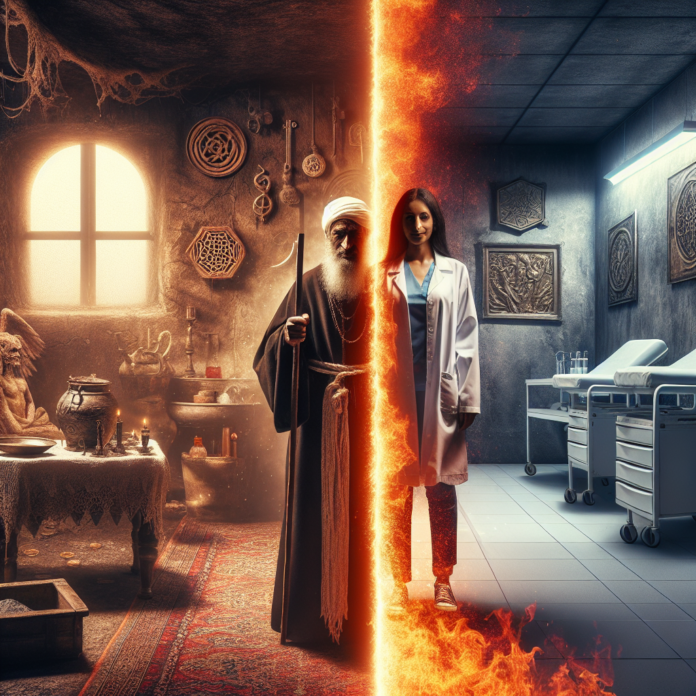In a world teetering on the axis between age-old traditions and progressive modernity, few domains have encapsulated this dichotomy as dramatically as the practice of exorcism. Rooted in ancient religious rites, traditional exorcism is a practice shrouded in ritualistic fervor, mystery, and often, controversy. While some argue that these time-honored practices possess sacred legitimacy, a growing faction champions modern exorcism practices, underpinned by psychological science and respect for human dignity. The ongoing clash between these schools of thought is revealing, and perhaps even necessary, as society grapples with the relevance and morality of traditional exorcistic methods.
The Dark Legacy of Traditional Exorcism
Traditional exorcism has its roots firmly embedded in the annals of history. The Middle Ages saw exorcists working in grim tandem with witch hunts and inquisitions. Highly dramatized rites involving chanting, holy water, and physical restraint were common, and these practices bore a dark legacy of torture, abuse, and even death. Documented accounts from the 16th century detail instances where so-called "possessed" individuals, often suffering from mental illness, were subjected to inhumane treatments to "free" them from their demons. Notably, the story of Anna Ecklund, an American woman subjected to severe and violent forms of exorcism in the early 20th century, serves as a chilling testament to the dangers of such archaic methods.
The Castigation of Mental Health
A glaring flaw in traditional exorcism is its disregard for mental health. Historical records and contemporary accounts alike reveal that individuals displaying symptoms of mental illnesses—conditions that modern medicine explains as schizophrenia, epilepsy, or severe depression—were frequently labeled as possessed. With anachronistic rites involving chants, holy relics, and extreme physical coercion, the so-called exorcists would attempt to "cure" these individuals, often exacerbating their suffering. This rejection of medical science is not just an oversight; it is a deliberate and pernicious ignorance that undermines the integrity and welfare of those in need.
A Modern Approach: Science and Compassion
Contrastingly, modern exorcism is a practice that seeks to fuse spiritual guidance with psychological science. Today’s forward-thinking exorcists, often in collaboration with mental health professionals, are keen to differentiate between genuine spiritual crises and clinically diagnosable mental health conditions. This interdisciplinary approach not only broadens the scope of effective treatment but also ensures that individuals are treated with the dignity and respect they deserve.
The Catholic Church, an institution deeply entrenched in the tradition of exorcism, has made strides in incorporating mental health evaluations in its modern-day practices. In 1999, the Vatican updated its exorcism guidelines, clearly stating that exorcists should not assume possession without carefully considering a psychiatric evaluation. Furthermore, educational programs aimed at clergy members emphasize the importance of understanding psychological disorders and collaborating with clinical psychologists. Such initiatives signal a pivotal shift from archaic practices to more enlightened methodologies.
Social Responsibility and Ethical Imperatives
Modern exorcism also emphasizes an ethical responsibility to protect individuals from harm. Gone are the days of brutal physical restraints and forcible ingestion of "holy" substances. Today’s exorcists, operating within a framework of ethics and human rights, prioritize the emotional and physical welfare of those they aim to help. The ethical guidelines for modern exorcists advocate for non-invasive practices that respect the bodily autonomy and psychological integrity of the individual, a far cry from the often-abusive traditional rites.
The Case of Anneliese Michel: A Cautionary Tale
As a cautionary tale, the tragic case of Anneliese Michel underscores the profound consequences of clinging to traditional exorcism practices. In 1970s Germany, Anneliese, a young woman suffering from severe psychological issues, underwent a series of intense exorcism rites that ultimately resulted in her death from malnutrition and dehydration. Her case became a media sensation and led to criminal proceedings against her exorcists and parents. The tragedy spurred an urgent reevaluation of exorcism practices and highlighted the need for medical and psychological interventions over antiquated rituals.
Conclusion: Choosing the Path of Progress
While tradition forms a significant part of cultural and religious heritage, clinging blindly to outdated practices in the realm of exorcism does more harm than good. Traditional methods, with their roots in historical abuse and ignorance of mental health, should be relegated to the past. The modern approach to exorcism, characterized by ethical responsibility, scientific collaboration, and compassionate care, presents a more effective and humane alternative. As society evolves, so too must its practices. Embracing modern exorcistic methods not only aligns with advancements in psychological science but also upholds the dignity and well-being of individuals at the heart of these spiritual and psychological crises.
In this evolving landscape of exorcism, the choice is clear: Progress over regressive tradition. The future should belong to a practice that heals, not harms. The exorcist’s dilemma, ultimately, should not be a dilemma at all.
